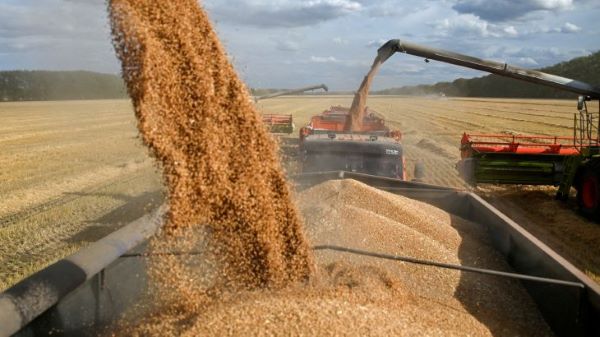Moscow says the Ukrainian grain pact will not be further extended following termination on July 17 if Russia’s demands are not met.

 QR code
QR code

Russia says no extension in grain deal before Moscow’s demands are met
18 Jul 2023 - 10:20
Moscow says the Ukrainian grain pact will not be further extended following termination on July 17 if Russia’s demands are not met.
At a press conference on Monday, Kremlin spokesman Dmitry Peskov said there would be no renewal to the deal, which expires on July 17, unless the demands were met.
"The Black Sea agreements are no longer in effect. The deadline, as the Russian president said earlier, is July 17. Unfortunately, the part of the Black Sea agreement that concerns Russia has not yet been fulfilled. As a result, it has been terminated," he said.
The agreement last came up for extension on May 18 and Russia agreed at that point to extend it for 60 more days.
The deal came with a separate agreement to facilitate shipments of Russian food and fertilizer. Moscow says no facilitation under that agreement has yet taken place. The Kremlin had initially threatened to abandon the deal if its concerns were not addressed.
"When the part of the Black Sea deal related to Russia is implemented, Russia will immediately return to the implementation of the deal," Peskov said.
The deal is officially known as the Black Sea Grain Initiative. It was brokered by Turkey and the United Nations on July 22, 2022 and has since, according to the Joint Coordination Center in Istanbul, allowed three Ukrainian ports to export some 32.9 million metric tons of grain and other food to the world, over half of that to developing countries.
Russia's Foreign Ministry also said despite UN efforts to extend the deal, obstacles to Russian food and fertilizer exports remained. “Only upon receipt of concrete results, and not promises and assurances, will Russia be ready to consider restoring the deal.”

Moscow demands the reopening of a pipeline carrying ammonia from Russia to the Ukrainian Black Sea port of Pivdennyi for export to global markets. The Kremlin says the West has blocked the export of ammonia in violation of past deals. Ammonia is a core component of fertilizer.
Ukraine, which is a major exporter of corn, barley, sunflower oil, and rapeseed oil, used to export most of its crop yields through its main ports on the Black and Azov Seas, but since the start of war, it has been forced to export by train or via its small Danube River ports.
Shortly after Peskov's remarks on Monday, Turkish President Recep Tayyip Erdogan said that Moscow wanted to extend the grain deal, despite Kremlin comments to the contrary.
"I think that despite today's statement, my friend [Russian President Vladimir] Putin wants to continue the agreement" that allows the export of Ukrainian grain to the Black Sea, which is due to expire at 2100 GMT.
The Turkish leader said he would hold talks with Putin on the issue before his anticipated visit to Turkey in August, adding that an agreement to extend the deal "without interruptions" could still be possible before his Russian counterpart's visit.
More than 30 million tons of grain and agricultural products have been exported under the initiative to date. Any disruption or halt to the flow of Ukrainian grain could worsen a food crisis in the poorest countries and increase global prices.
The extension of the deal will be considered a win for countries in Africa, West Asia and parts of Asia that are dependent on Ukrainian wheat, barley, vegetable oil and other affordable food products, particularly as drought takes a toll.
Story Code: 600652